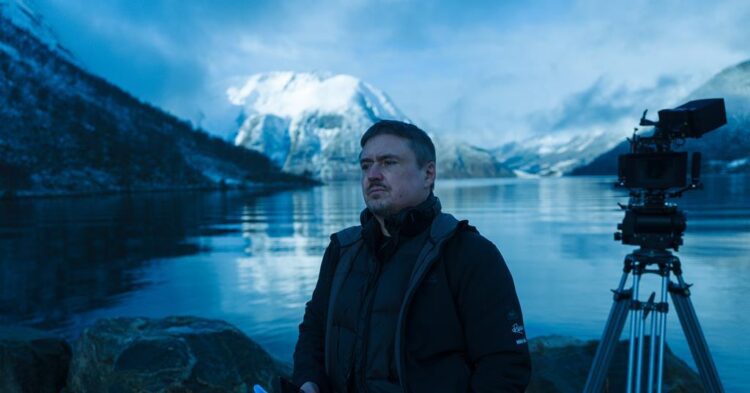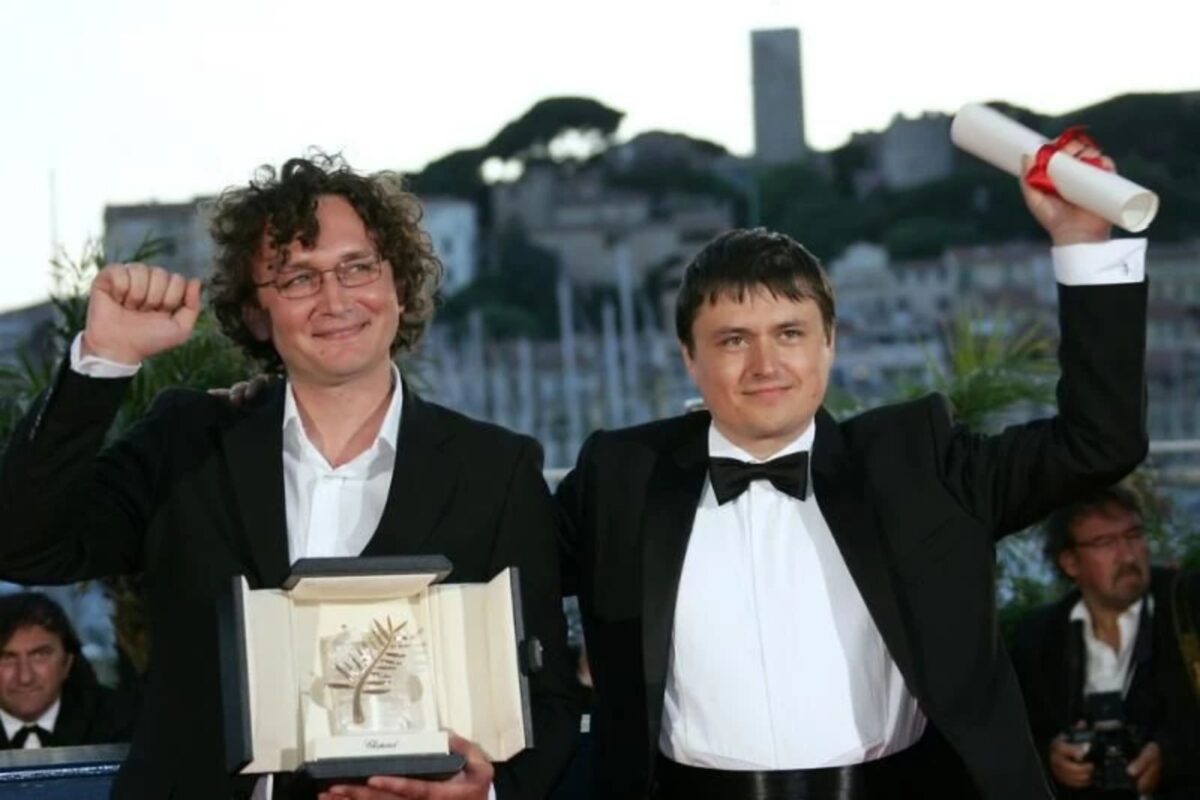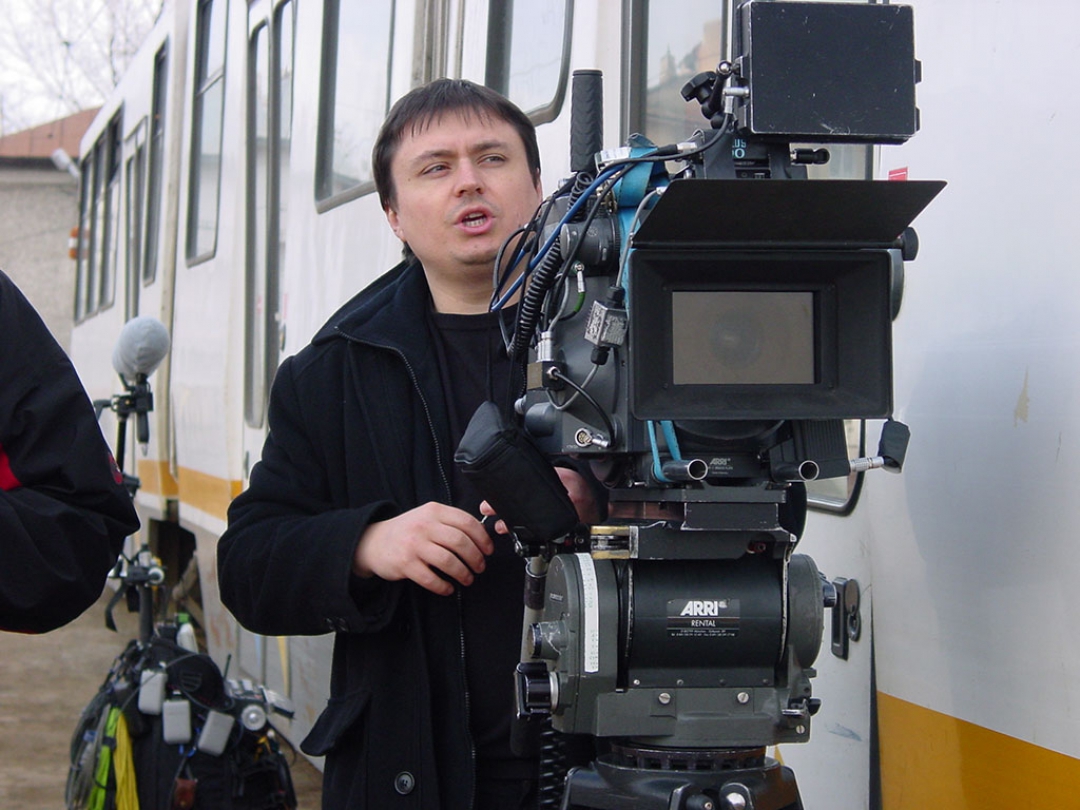
For all the glories that Romanian cinema has enjoyed in the last quarter-century, 2026 has the potential to outshine them all. If one man will be responsible for this, it is probably Sebastian Stan, an American mega-star of Romanian extraction who has taken the guts of a year out of his busy schedule to star both in Radu Jude’s upcoming Frankenstein in Romania and Cristian Mungiu’s Fjörd.
Jude works famously quick, but don’t be surprised if Mungiu’s project is with us first––likely next May at the Cannes Film Festival, a place that must feel like a second home to the director since winning the Palme d’Or there with 4 Months, 3 Weeks and 2 Days in 2007. Fjörd reunites Stan with Renate Reinsve, his co-star from A Different Man. If awards prognosticators are anything to go by, this will mean that Mungiu will be able to market his film as the meeting of two Oscar nominees. Not even in the most dizzying days of the Romanian New Wave did a filmmaker from the country command that kind of production.
Right now, that’s mostly a story for another day. Earlier this week, the director was on guest-of-honor duties at the Warsaw Film Festival, where he delivered a characteristically process-focused masterclass to a room half-full of film students and at least one reporter. In person, Mungiu talks in much the same way as he lectures: a low, steady, unmistakably purposeful patter, and rarely (if ever) resorting to anything as frivolous as an anecdote.
We met just before his talk in the foyer of Kinoteka, a multi-screen cinema situated in the bowels of the Palace of Culture. It’s a Stalinist behemoth that still dominates the city’s skyline, even amongst the dazzling modernism of the high rises and advertisements around it––a clash of East and West if ever there was one. It felt like a fitting location.
The following conversation has been edited and condensed for clarity.
The Film Stage: I’m really fascinated to hear more about Fjörd, if you’re able to talk a bit about it today. It’s your first time filming in Norway and your first time working with big-name stars. Did you feel a change in your approach in any way?
Cristian Mungiu: Well, I think that it’s the same kind of cinema that I did before. And I don’t know––we will see––I hope it makes a difference in terms of interest from the spectators, to watch these talented people. I was not working within the star system before now, but I was happy to work with these people without having to change my way of making cinema. We got along quite well and I’m happy that I started with Sebastian, because he speaks some Romanian and he wished to speak Romanian in the film. I’m very curious to see what’s going to be the continuation of this once I move on and try to work with well-known actors who don’t speak Romanian. What will happen there? I’m really curious.
Your way of making cinema tends to mean long takes, a wide range of speaking parts, overlapping dialogue, and so on. How does this influence your storytelling?
There’s no point in writing and indicating a lot of small details about what’s going to happen because you know it’s not going to be like this. All I have is the choreography of the situation, and I do this because, as a method, it’s a way of respecting the integrity of the realism. There’s no cuts in real time, so we try to stage every moment continuously and try to find the position from which we can record it. It’s not easy for the actors. It’s easy in the sense that they can develop some feelings without being cut, but at the same time, the level of precision, as you can imagine, is very different. Anybody can say one line, and if you cut and edit, you can do something with it, but once you have a scene of two, three, four, five, ten, fifteen minutes, with two, seven, nine people talking, it’s different.
It’s not for everybody, so the casting is very important. We have to check beforehand if they understand what the style is going to be. They need to get trained a little bit. But eventually, then, they start liking it because it gives them a kind of freedom to focus more and more on expressing the emotions.

4 Months, 3 Weeks and 2 Days at Cannes in 2007
We’re coming up on 20 years since 4 Months, 3 Weeks and 2 Days won the Palme d’Or, yet many countries seem to be going backwards on abortion, especially in the U.S. Do you see the film as a statement about the importance of having the right to choose?
First of all, it was strange: a few years ago I started being asked if I would give the rights to show the film for American education. I never thought that this could happen. But, besides this, I think it’s always good to make films that reflect the socio-political situation of that moment. That said: I don’t like when my films are being seen as militant in any direction. From my perspective, 4 Months was a film that showed the complexity of that system in which you needed to make a choice––between freedom, responsibility, motherhood––and that’s a context which is very difficult to re-identify in the world of today.
So I think people who wish to address this today need to ask: what is the complexity of this choice in the world of today? And also, we shouldn’t forget, I think the difference between mainstream cinema and independent cinema––at least the kind that we make in this part of the world––is that we don’t come up with the solutions and a POV that we want to strongly support. We just tell stories and show complex situations in which people need to use their critical spirit to make a choice. I think this is what cinema should be.
Your previous film, R.M.N., explored a few incredibly complex issues––namely globalization and the challenges facing Europe, the European Union, and so on. Will you be continuing to explore these issues going forward? From what I can gather about Fjörd, it certainly sounds like it.
In a way, yes, I will continue doing this. We had a film here last year in Warsaw, Traffic, which I wrote. It’s part of a series following this impact between the Eastern part of Europe and the Western part of Europe, and it continued to talk about this difference between, if you like, this idealization of the European model and the reality, which doesn’t match this dream all the time. It’s a very complex continent with a lot of history and a lot of problems, so I think this is a very complex thing that I want to continue investigating because, in this global context of having to find an answer to migration, it’s something that shows up a lot––especially for the countries in the region that really generate a lot of migration.
And it’s interesting for me, for example, how we have different feelings when we are migrants in Western Europe and when we receive migrants from Eastern Europe and less-developed countries. And I’m very sad to say: we haven’t learned much from not being very well-treated when we need to treat some other people. So maybe more empathy would help to understand this situation––that people are people and whenever you use these kinds of stereotypes about ethnicity, you start losing the idea of individuality with the guy that you’re talking to.

You once said that R.M.N. is a film about the end of democracy. Since you shot that movie we’ve seen two wars, Trump’s return as president, and many right-wing organizations on the rise. What do you think about democracy now?
We used to say all the time that democracy was the best of the worst models, and yes, it used to be. That’s not saying that we’ve found something better, but at the same time it’s saying that in this world of fake news and post-truth––unless we invest highly in educating people before asking them what their opinion is––the result might not be the one you would expect in the democratic process. We used to say that the democratic process was one in which people decide. Sometimes these people haven’t got the time to really know precisely the issues on which they are expressing themselves.
With R.M.N., I was trying to show that this can lead to very strange democratic decisions, ones that can still be xenophobic. So it’s really important to put some pressure on our decision-makers, in corridors that can influence things, to make sure that the importance we give to education in the long term, and to the critical spirit, grows. Because if not, the direction this world is going is not going to be the one you were hoping for. As you say: everybody has this feeling that the state of the world is a bit unstable, or that it’s not going in the right direction. So we actually need to make this effort of trying to strengthen this idea, of educating the critical spirit––especially with young people.
The way that you approach your films, it sometimes feels like you’re putting your deepest fears in front of the audience. Is education the biggest fear for you going forward?
I can’t speak about the future; all I can speak about are the next things I’m going to do. I have this film in post-production. It’s about this huge polarization in the society of today. If you watch what is happening in a lot of countries, this difference between conservatives and progressives has gotten so big that people have started hating each other, literally, and hoping that the other side disappears, with nobody left in the middle. This is a problem for the society we are living in today. It’s not only that we have these wars and conflicts; it’s that every country has this ongoing war between these extreme views. And I think everybody is exaggerating a little bit in their own direction.
We need to do something about this because the whole concept of living together was based on having some common values, and nowadays we realize that, in a lot of societies, there are very few values that we share in common. So I think that this is one of the fears that I’m having, that this might end up wrong, and we need to do something before this polarization is complete. It’s also connected with education, if you ask me, because whenever you have children your fears become connected with education, because I don’t know what kind of world my children are going to grow up in and I don’t know what we can do so we don’t pass them the responsibility of fixing what went wrong. We need to deliver them the world in the same state as it came to us. And when it came to us, to be honest, it was more peaceful and reasonable than it is today.
I’ve read that Fjörd will focus on two families, specifically around cultural differences regarding raising children. Will this topic of education be the central focus?
It doesn’t happen inside a school, but yes, these are always the institutions that are most important in society. Since I have this preoccupation with what we are passing to the next generation, there are children there, but it’s not so much about what school tells us; it’s about the difference between what school tells us and how people see what real life is. Because it’s not at all the same thing. What you tell your children can be very different, based on what education you got. You have to understand that they don’t live in the same kind of world that you lived in, so you have to adapt as a parent. For a parent, this means finding the right balance between the values you try to pass down and the freedom that you need to give to children, hoping that they will be wiser and more empathetic than we were.
Fjörd will be released in 2026 by NEON.
The post Cristian Mungiu on Fjörd, Family, Sebastian Stan, and the State of the World first appeared on The Film Stage.
from The Film Stage https://ift.tt/X2tfWFP


0 Comments